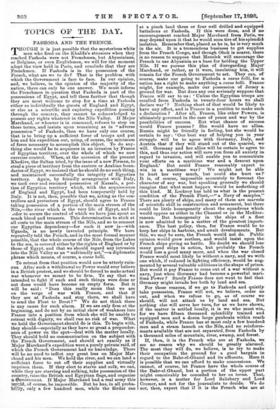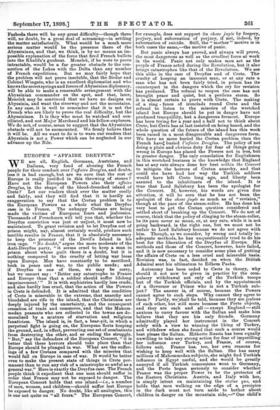TOPICS OF THE DAY.
FASHODA AND THE FRENCH. THOUGH it is just possible that the mysterious white men who fired on the Khalifa's steamers when they reached Fashoda were not Frenchmen, but Abyssinians, or Belgians, or even Englishmen, we will for the moment adopt the view held in Paris, and conclude that they are Frenchmen. If Fashoda, is in the possession of the French, what are we to do ? That is the problem with which the Government is face to face. In our opinion, and, we believe, in the opinion of the majority of the nation, there can only be one answer. We must inform the Frenchmen in question that Fashoda is part of the possessions of Egypt, and tell them further that though they are most welcome to stop for a time at Fashoda either as individually the guests of England and Egypt, or else as a scientific and exploring expedition passing through the country, they cannot be acknowledged to possess any rights whatever in the Nile Valley. If Major Marchand, or whoever is in command, refuses to stop on these terms, and insists upon remaining as in "adverse possession" of Fashoda, then we have only one course, that is to bring up a sufficient force of troops and put him and his expedition out, using, of course, the minimum of force necessary to accomplish this object. To do any- thing else would be to acquiesce in an invasion by France of Egyptian territory, over the whole of which we now exercise control. When, at the accession of the present Khedive, the Sultan tried, by the issue of a new Firman, to steal a piece of territory from the eastern or Arabian boun- daries of Egypt, we insisted that he should do no such thing, and maintained successfully the integrity of Egyptian territory. Again, by friendly arrangement with Italy, we took over and resumed possession of Kassala, a por- tion of Egyptian territory which, with the acquiescence of England and Egypt, had been temporarily held by Italy. It is not, then, possible that we, acting as the con- trollers and protectors of Egypt, should agree to France taking possession of a portion of the main stream of the Nile,—the river which is the very life of Egypt, and in Arder to secure the control of which we have just spent so much blood and treasure. This determination to stick at all costs to the main stream of the Nile, and so to connect our Egyptian dependency—for such it now is—with Uganda, is no newly invented principle. We have repeatedly told the French, and in the most formal manner possible, that the whole course of the Nile, from the Lakes to the sea, is covered either by the rights of England or by those of Egypt, and that we should regard any intrusion into the Nile Valley as an "unfriendly act,"—a diplomatic phrase which means, of course, a costa bell.
To retreat from that position would now be utterly ruin- ous. Aftee such a withdrawal no Power would ever believe in a British protest, and we should be forced to make actual war whenever we meant to be firm. To say that we intended to fight if such and such things were done or not done would have become an empty form. But it will be said : "Does this really mean that we are on the verge of war with France, and that if they are at Fashoda and stop there, we shall have to send the Fleet to Brest ?" We do not think there is any cause for such alarm. If we are only firm at the beginning, and do not by an initial show of weakness lure France into a position from which she will be unable to retreat with dignity, we shall run no risk of war. What we hold the Government should do is this. To begin with, they should—especially as they have so great a preponder- ance of power on the spot—deal with the matter locally. They should hold no communication on the subject with the French Government, and should act exactly as if Major Marchand's expedition were a purely private raid, of which the French Government had no knowledge. There will be no need to inflict any great loss on Major Mar- chand and his men. We hold the river, and we can land a sufficient force to cut off their supplies and virtually imprison them. If they elect to starve and sulk, we can, while they are starving and sulking, take possession of the country, raise the British and Egyptian flags, and organise 3 eovernment. If Major Marchand had a real army this we221d, of course, be impossible. But he has, in all proba- 1.0,V, only a few hundred men, while the Birder can at a pinch land three or four well drilled and equipped battalions at Fashoda. If this were done, and if no encouragement reached Major Marchand from Paris,. we may depend upon it that he would soon tire of his splendid isolation. Remember that, placed as he is, he is very much in the air. It is a tremendous business to get supplies from the French Congo, and though Obok is nearer, there is no reason to suppose that Menelek will encourage the French to use Abyssinia as a base for holding the Upper Nile. If we pursue this plan of disregarding. Major- Marchand, or rather, as it were, insulating him, it will remain for the French Government to act. They can, of course, make our going to Fashoda a mous belli, for s.
nation has a right to make anything a casus belli. France. might, for example, make our possession of Jersey a- ground for war. But does any one seriously suppose that France will say to us : 'Unless the Egyptian troops are recalled from Fashoda in twenty-four hours we shall declare war ' ? Nothing short of that would be likely to- have any effect, and is France in a position to make such a declaration ? After all, France, like other Powers, is ultimately governed in the case of peace and war by the possibilities of success. But what chance of success. would France possess ? She would have no allies.. Russia might be friendly in feeling, but she would be certain to say Our best way of helping you in your struggle will be to agree with Germany, Italy, and Austria that if they will stand out of the quarrel, we will. Germany and her allies will be certain to agree to. this, and thus our action will save you from all anxiety in regard to ]nvasion, and will enable you to concentrate your efforts on a maritime war and a descent upon. England.' But could France reasonably expect to win in a maritime war? We might not be able to hurt her very much, but could she hurt us ? It is, of course, impossible accurately to forecast the character of any war, but speaking generally we should imagine that what must happen would be sonAething of this kind. M. Lockroy has told us what is the present condition of the French Fleet,—" a Navy of samples.' There are plenty of ships, and many of them are marvels of scientific skill in construction and armament, but there could be little homogeneity about the squadrons which would oppose us either in the Channel or in the Mediter- ranean. But homogeneity in the ships of a fleet is now admitted to be a matter of the greatest import- ance. The best policy, then, for France would be to keep her ships in harbour, and await developments. But this, we may be sure, the French would not do. Public- opinion would grow restless, and would insist upon the French ships giving us battle. No doubt we should lose many good ships in action, but probably the French would lose a good many more, and when the war closed France would most likely be without a navy, and we with one which, if reduced in fighting efficiency, would be aug, mented by several valuable additions in the shape of prizes. But would it pay France to come out of a war without as navy, just when Germany had become a powerful mari- time Power ? Surely France does not want to feel that Germany might invade her both by land and sea.
For these reasons, if we go to Fashoda and quietly take possession, France will not, we believe, order us. out, and when we refuse to go, as of course we should, will not attack us by land and sea. But nothing else will serve her turn, for as we have shown,. if the matter is settled locally, it is we who must win,. for we have fifteen thousand splendidly trained and equipped men and a, dozen large gunboats within reach, of Fashoda, while France has at most only a few hundred men and a steam launch on the Nile, and no reinforce- ments available that are not separated, from Fashoda by a thousand miles of mountain, river, swamp, and forest.
If, then, it is the French who are at Fashoda, we see no reason why we should be greatly alarmed. The most they will do, we believe, is to try to make their occupation the ground for a good bargain in regard to the Bahr-el-Ghazel and its affluents. Here it is possible that we can afford to make concessions. We cannot, of course, let France have the whole course of the Bahr-el-Ghazel, but a portion of the upper part might conceivably be conceded to her on terms. That, however, is a matter for Lord Salisbury and Lord Cromer, and not for the journalists to decide. We do not, then, expect that if it is the French who are at Fashoda there will be any great difficulty—though there will, no doubt, be a great deal of screaming—in settling the matter satisfactorily. What would be a much more serious matter would be the presence there of the Abyssinians, and that, we think, is by no means an im- possible explanation of the force that fired French bullets into the Khalifa's gunboat. Menelek, if he were to prove intractable, would be a far greater obstacle to the con- nection of the Lakes with the Delta than any number of French expeditions. But we may fairly hope that the problem will not prove insoluble, that the Sirdar and Colonel Wingate, who is an excellent diplomatist and who knows the secret springs and forces of Abyssinian diplomacy, will be able to make a reasonable arrangement with the Abyssinian commander on the spot, and that, later, Menelek may be convinced that we have no designs on Abyssinia, and want the riverway and not the mountains. In any case, it is well to remember that it is not the French who are likely to prove the real difficulty, but the Abyssinians. It is they who must be watched and con- ciliated, and not Major Marchand and his fellow-explorers. We do not, of course, mean to suggest that the Abyssinian obstacle will not be surmounted. We firmly believe that it will be. All we want to do is to warn our readers that Abyssinia is not a Power which can be neglected in our advance up the Nile.



































 Previous page
Previous page